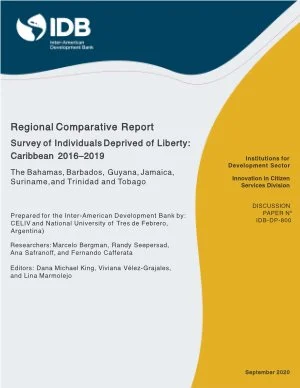By Bergman, Marcelo; Seepersad, Randy; Safranoff, Ana; Cafferata, Fernando G.
This report presents new systematic data on the characteristics of inmates in prisons in six Caribbean countries, the factors which may have led to their incarceration, the conditions within the prisons facilities, the judicial processes that led to their convictions, and their perspectives of re-entry. The data were collected through the Survey of Individuals Deprived of Liberty in The Bahamas (2016), Barbados (2018), Guyana (2017), Jamaica (2018), Suriname (2018), and Trinidad and Tobago (2018). Special emphasis is placed on gender, age, and legal status as well as on the problem of recidivism by seeking to identify the conditions that led prisoners to become repeat offenders. There were several important findings that highlight strengths and weaknesses within the correctional systems of the Carib-bean. This study provides relevant insights to improving the general situation of prisons in the Caribbean region. Overall, the results suggest that more effort needs to be placed on programs and policies that improve inmates conditions within the prisons (more educational programs and paid employment opportunities; adequate legal defense and stream-lined court processes; reduced overcrowding and victimization, among other things). Finally, the report highlights that comprehensive re-entry strategies should be developed for all Caribbean countries.
Center for Latin American Studies on Insecurity and Violence; 2020.


